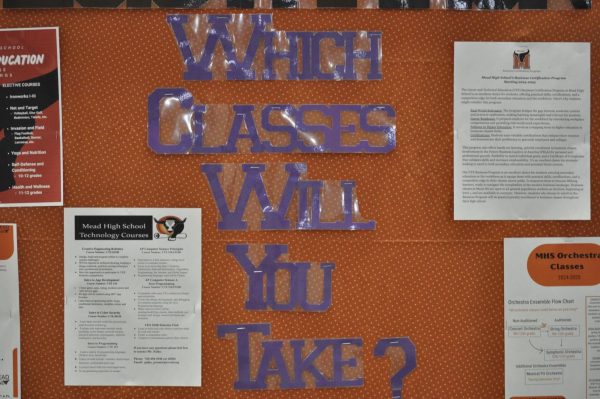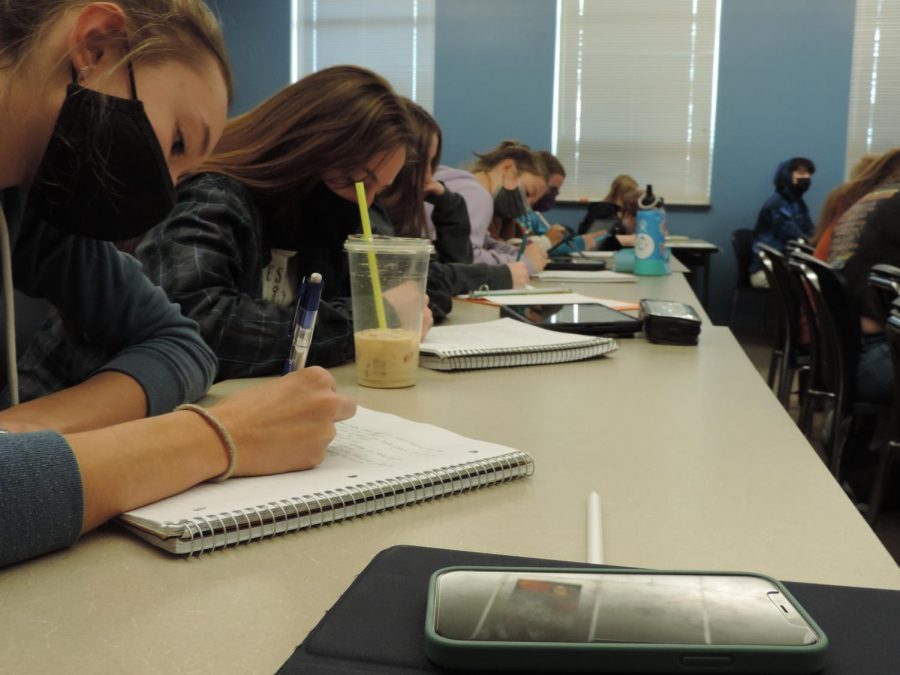AP exams are in May, studying can seem overwhelming
Students and teachers with AP exam and class experience share their suggestions for study techniques
Students take notes in Mr. Parsons’ AP U.S. Government and Politics class.
Advanced Placement (AP) exams will take place in May for students registered for one or more AP test(s).
Study strategies for AP exams and AP classes in general can be very different from regular exam strategies. Many with experience taking AP classes and exams or teaching AP classes and preparing students have several suggestions for those new to the exam process or looking to pick up the intensity of their studying these next few months.
MHS teacher Mr. Alex Garcia has taught AP U.S. Government and Politics, AP Comparative Politics, and AP European History in the past. For year-long study practices, he highly suggests doing assignments on time, participating in class discussions, and revising work based on teacher feedback. Throughout teaching AP classes, Mr. Garcia has found that “students who are more successful [on the exams] stay up with their work”.
“Ask a lot of questions,” Garcia advised. “Students who do well… are not passive — they’re reactive about trying to fill in their own gaps of understanding.”
Whether filling those gaps happens through watching key concept YouTube and College Board videos, using old AP exams to practice multiple choice and free response questions, or studying in peer groups, Garcia shares that as you practice more, the less difficult the final exam becomes.
Registration finalization for the 2022-2023 school year is currently taking place, and for those looking to take one or more AP classes next year, Mr. Garcia highly suggests registering for the test(s) as well.
Garcia shared that “having taken AP classes in high school and not having taken all the exams”, he wishes he would have. He believes the experience of taking the exam, aside from the score, is valuable.
Mr. Benjamin Holskin, who is currently teaching AP Calculus, also suggests registering for the exam. He works to integrate exam strategy into his lessons throughout the year. Holskin said, “I always try to reference… how it’s going to be assessed on the AP exam.” Oftentimes preparing for the different phrasing, grading scale, and format of the exam is more challenging than the content itself.
Along with the exam, Holskin prepares his students for whatever future college level calculus classes they’ll be enrolled in.
In terms of long term strategy, he suggested “doing the most challenging parts of the assignments throughout the whole school year.” When students get to the exam, Mr. Holskin tries to make sure it almost feels easier than what they’ve been working on in class.
Wren Pritchett (‘23) has taken seven AP classes in the past and is currently enrolled in five. Pritchett (‘23) said in his experience, “studying incrementally throughout [second] semester instead of loading up at the end is much better” in terms of stress management.
“Take AP classes that you’re… interested in,” he added. “AP classes are only worth it if they’re something that you’re interested in.”
For the last few months up until the May exam, Pritchett (‘23) suggests using internet resources such as study guides and videos to “clarify topics and concepts that you don’t understand”.
Mateo Gonzaga (‘23), who will have taken six total AP classes by the end of his junior year, suggests using resources like vocabulary lists and Khan Academy to study.
Study tools are going to vary heavily depending on the AP class students are taking, so Gonzaga (‘23) said, “If your teacher gives you tools, use them.”
Your donation will support the student journalists of Mead High School. Your contribution will allow us to purchase equipment and cover our annual website hosting costs.

Arizona Lee is a senior, and this is her second year as Editor-in-Chief of The Mav. She enjoys reading, listening to good music, and spending time with friends. She hopes to guide the student newspaper and broadcast this year to continued success.

DJ Gallegos is a junior. They enjoy playing piano, cooking, playing video games, and most things that teenage boys like to do. They are this year's photography editor. They are looking forward to sharing amazing pictures and baking recipes.











